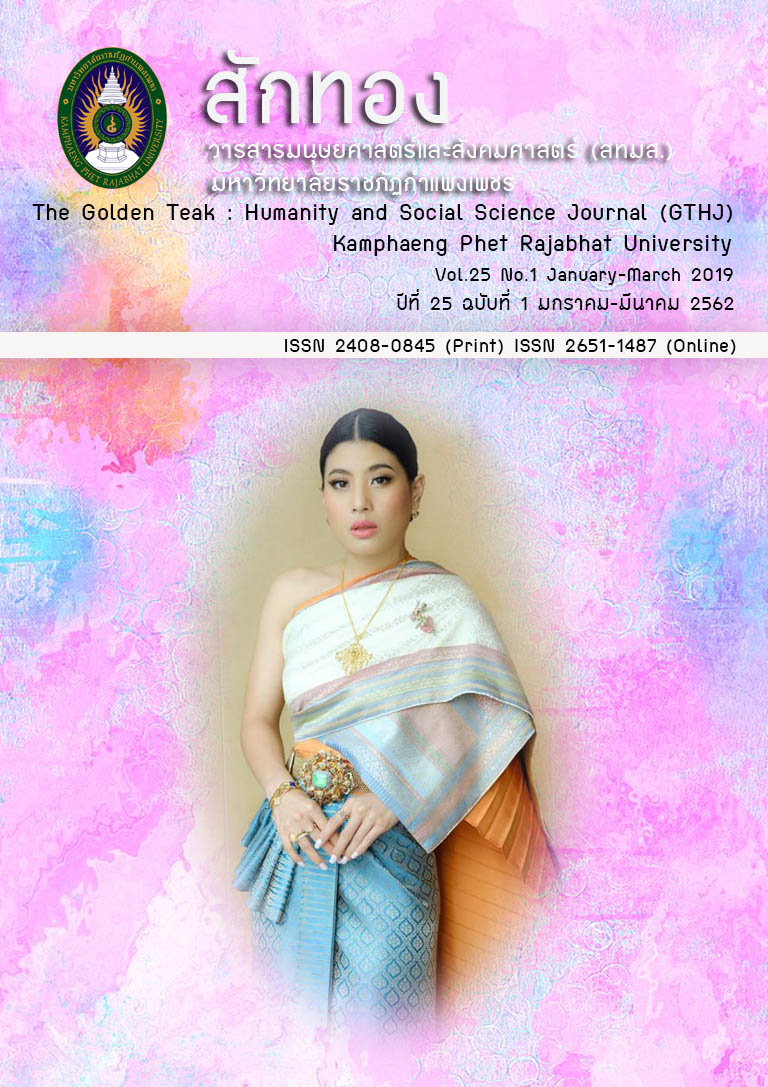Salient Themes in Thai Literature as a Template for Development of Self-Management Skills in Upper Secondary School Students in Bangkok Metropolis
Main Article Content
Abstract
Self-Management skills were an important principle applied to achieve happiness in life and be a qualified member of Thai Society. Youth should practice these skills at a young age in order to create a brighter future. Thai Literature was a precious national heritage. It denotes the former poet’s talents which conveyed their imaginative and beautiful writing based on Thai culture belief, and the way of life in the past. Thai Literature helps reflect teaching self-management skills for students this quantitative research, aims at studying present problems and the needs of self-management skills foe upper secondary school students through Thai literature. The research found that the management skills in working, relationships with other people and self-esteem revolves around dynamic norms, westernizations, technology and the economic competitiveness for upper Secondary school students. There Were five problems dealing with the development of self-management skills or Self-esteem: 1) Lack of life objective 2) Inappropriate behavior 3) Trust worthiness 4) Lack of problem solving skills 5) Lack of knowing Dharma and how to use it in daily life. The following have 5 problems dealing with the relationships among people: 1) Speaking skills 2) Public minds 3) Personal Behavior 4) Inter-personal relationships 5) Self-center. The management skill of working: There are 5 situations which are as follows: 1) Devotion to one-self in the work 2) Responsibility 3) Professionalism and expertise 4) Industriousness 5) Intellectualism The need of self-management skills can be effective for the upper secondary school student, must have the co-operation between parents and school is severely considered, they should set as a good example for the student to follow Analysis of Thai literature revealed that the principle of “Management skill self-esteem has 5 strengths: 1) Realization of one’s need. 2) Humility and respects. 3) Truth and honors. 4) Intellectual problem solving. 5) Acquiring knowledge and practicing about Dharma. The principle of Management skill on public minds has 5 strength. 1) Development of constructive Speech 2) Conceits of giving, taking and helping 3) Setting good examples 4) Understanding multiple views 5) Righteousness and fairness. The principle of management skills on working has 5 strengths 1) Awareness of devoting oneself to work 2) Responsibility for one’s duty 3) Acknowledge and expertise in one’s job 4) To pay attention and to be industrious 5) Work intellectually Moreover Thai literature Research is contemporary so that one cans endeavors to create principle of Management skills effectively. A Template for Development of self-management skills for upper secondary school students can be used through self-taught learning. The template is qualified, modern and attractive. The presentation of contents not only is clarified but the language is also easy to understand. Moreover, one who studies the template can develop oneself after using the principles of self -management skills. In conclusion, Salient themes in Thai literature as a template for Development of self-management skills for upper secondary school students have been highly valued. Students can make use the salient themes in Thai literature as the template to develop one self. The fruitfulness will benefit students themselves, their society and their country.
Article Details
บทความที่ได้รับการตีพิมพ์เป็นลิขสิทธิ์ของวารสาร สักทอง : วารสารมนุษยศาสตร์และสังคมศาสตร์ สถาบันวิจัยและพัฒนา มหาวิทยาลับราชภัฏกำแพงเพชร
ข้อคิดเห็นใดๆ ที่ปรากฎในวารสารเป็นวรรณกรรมของผู้เขียนโดยเฉพาะ ซึ่งมหาวิทยาลัยราชภัฏกำแพงเพชรและบรรณาธิการไม่จำเป็นต้องเห็นด้วย
References
_______. (2001). Banduri : Thai Literature and Music (Thai Verse Ways). Bangkok : The Fine Arts Department.
Chantavanich, S. (2013). Qualitative research methods. (Second Edition). Bangkok : Chulalongkorn University.
Kraiwichien, T. (2007, November-December). Special lecture on Royal duties His Majesty's Law. Government Official Journal, 52(6), 20-43.
Malinowski, B. (1969). The Group and Individual in Function Analysis. American Journal of Sociology, 2(5), 108-120.
Mekswan, T. (2000). Good governance with Thai government. Nonthaburi : Civil Service Development Institute. Office of the National Education Commission. (2002). National Education Act B.C.1999 And amendments (No. 2) B.C.2012. Bangkok : Prikwaan Graphic.
Prapapittayakorn, P. (1976). Thai tradition and occultism in Khun Chang Khun Phaen. Bangkok : Charoentham.
Radcliffe-Bown, A.R. (1964). Structure and Function in Pnmitive Society. London : Oxford University Press.
Radcliffe-A.R. Bown. (1940). The Andaman Islanders. New York : Free Press.
Sriworapoj, B. (2013). Ramayana painting at Suthat Thep Wararam Temple. Bangkok : Bureau of Literature and History, Department of Fine Arts.
The Fine Arts Department. (2011). 100 years Of the establishment of the Fine Arts Department. Bangkok : Rungsilp Printing.
_______. (2013). Sowat Kloansuad. Bangkok : The Fine Arts Department.
Wasi, P. (1994). Future education development In the approach to future education development. Bangkok : Office of the National Education Commission.
Wongkhamchan, S. (2017, May-August). Student ethics and guidelines for student ethics development. Sakthong : Journal of Humanities and Social Sciences, 23(2), 72.
Yamnadda, S. (1991, P. 32). Academic articles, languages and Thai-Pali-Sanskrit literature. Bangkok : Chulalongkorn Printing.


